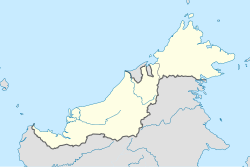Sibu, Sarawak
| Sibu | ||
|---|---|---|
| Town | ||
| Other transcription(s) | ||
| • Chinese | 诗巫 | |

Clockwise from top right: Wong Nai Siong Memorial Garden, Jade Dragon Temple, An-Nur Mosque, Masland Methodist church, Tua Pek Kong Temple, Wisma Sanyan, and swan statue.
|
||
|
||
| Nickname(s): "Swan city"/ "New Fuzhou" | ||
| Coordinates: 2°17′16″N 111°49′51″E / 2.28778°N 111.83083°ECoordinates: 2°17′16″N 111°49′51″E / 2.28778°N 111.83083°E | ||
| Country |
|
|
| State |
|
|
| Division | Sibu Division | |
| District | Sibu District | |
| Settled by James Brooke | 1862 | |
| Settled by Wong Nai Siong | 21 January 1901 | |
| Municipality | 1 November 1981 | |
| Government | ||
| • Type | Sibu Municipal Council | |
| • Chairman | Tiong Thai King | |
| • Resident | Hii Chang Kee | |
| Area | ||
| • Sibu town | 129.5 km2 (50.0 sq mi) | |
| Elevation | 0 m (0 ft) | |
| Highest elevation | 59 m (194 ft) | |
| Population (2010) | ||
| • Sibu town | 162,676 | |
| • Density | 1,256/km2 (3,250/sq mi) | |
| Time zone | MST (UTC+8) | |
| • Summer (DST) | Not observed (UTC+8) | |
| Postal code | 96xxx | |
| Area code(s) | 084 (landline only) | |
| Vehicle registration | QS (for all vehicles except taxis) HQ (for taxis only) |
|
| Website | www |
|
Sibu /ˈsibuː/ (simplified Chinese: 诗巫; traditional Chinese: 詩巫; pinyin: Shīwū) is an inland town at the central region of Sarawak and the capital of Sibu District in Sibu Division, Sarawak, Malaysia. The town is located on the island of Borneo. The town covers an area of 129.5 square kilometres (50.0 sq mi). It is located at the confluence of the Rajang and Igan Rivers, some 60 kilometres from the South China Sea and approximately 191.5 kilometres (119 mi) north-east of the state capital Kuching. Sibu is mainly populated by the Chinese especially the Fuzhou Chinese ethnicity. Other local ethnic indigenous groups such Melanau, Malay, and Iban are also present, but unlike other regions of Sarawak, they are not as significant. The town population as of the year 2010 is 162,676.
Sibu was settled by James Brooke in 1862 when he built a fort in the town to fend off attacks by indigenous Dayak people. Following this, a small group of Chinese Hokkien people settled around the fort to carry out business activities safely in the town. In 1901, Wong Nai Siong led a large scale migration numbering 1,118 Foochow Chinese from Fujian province of China into Sibu. This made Sibu being referred popularly as "New Fuzhou". Sibu bazaar and the first hospital in Sibu was built by the Brooke government. Lau King Howe Hospital and a number of Methodist schools and churches were built in the 1930s. However, the town of Sibu was burnt to the ground twice in 1889 and in 1928 but it was rebuilt after that. There was no fierce fighting in Sibu during the Japanese occupation of Sarawak in 1941. The Japanese installed a new Resident at Sibu in June 1942 and Sibu was renamed to "Sibu-shu" in August 1942. After the Japanese surrender in 1945, Sarawak was ceded to the British as Crown Colony. This has caused a dissatisfaction amongst a group of young Melanau people in Sibu who were pro-independence. As a result, the second British Governor of Sarawak, Sir Duncan George Stewart was assassinated by Rosli Dhobi when he visited Sibu in December 1949. Rosli was later hanged to death at Kuching Central Prison in 1950. Sibu and the Rajang basin also became the centre of communist activities from 1950 and it continued even after the Sarawak independence in 1963. A Rajang Security Command (RASCOM) was then established to curb Communist activities in the area. Communist insurgency in Sarawak was significantly impaired in 1973 and later ended in 1990. Sibu was upgraded to the municipality status in 1981. The town received a royal visit in September 2001. The town is also a gateway to Sarawak Corridor of Renewable Energy (SCORE) since 2008. In 2011, 110th anniversary of Foochow settlement was celebrated in Sibu.
...
Wikipedia


